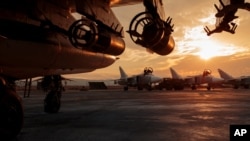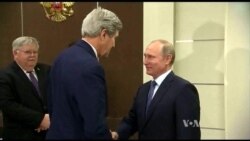Russia’s stepped up aerial bombardment in Syria will be a focal point for the United States and other members of the International Syria Support Group when it meets this week in Germany.
The group, which includes Syria-backers Russia and Iran, is meeting Thursday on the sidelines of the Munich Security Conference.
It is the group’s first full meeting since U.N.-mediated proximity talks on a political transition in Syria bogged down, partly because of opposition protests against Russian-backed aerial assaults in Aleppo.
The bombing campaign has forced thousands of Syrians to flee their homes, with many of them heading toward the already crowded Turkish border.
On Tuesday, the day before he heads to Munich, Secretary of State John Kerry raised concerns about Russia during a State Department appearance with Egypt’s foreign minister, Sameh Shoukry.
WATCH: US, World Powers Seek Change in Russian Behavior
“Russia’s activities in Aleppo and the region right now are making it more difficult to be able to come to the table to be able to have a serious conversation,” said Kerry.
Egypt is also part of the International Syria Support Group, which has been backing U.N.-mediated talks designed to lead to a political transition in Syria. Foreign Minister Shoukry said a successful resumption of talks could eventually increase regional stability.
“Hopefully the political process that has been initiated in Syria will provide us all with more ability to control the spread of terrorism in Syria and for that country to regain its stability,” he said.
Kerry met in December with Russian President Vladimir Putin and Foreign Minister Sergey Lavrov in Moscow. In recent weeks, Kerry and Lavrov have held a series of phone calls on the crisis in Syria.
“I would not read too much into the Russian participation on the political track,” said former U.S. ambassador to Syria Robert Ford.
Ford, now a scholar at the Middle East Institute, said it is more important to watch Russia’s military action in Syria, a move that he said is unlikely to receive a strong challenge from the United States.
“I think that President Putin has an understanding that the Obama administration’s focus is on trying as much as possible to limit involvement in Middle East conflicts,” said Ford, in a VOA interview.
Moscow pushing back
Russia, for its part, has pushed back against accusations that its support for the Syrian regime and its stepped up bombing campaign played a role in derailing the first round of proximity talks.
“We think that this opinion is incorrect,” said Kremlin spokesman Dmitry Peskov, according to Russia’s Interfax news agency.
He said Moscow had “consistently” made efforts to help secure a peaceful political settlement in Syria.
But differing definitions of supporting Syria have contributed to tensions between Russia and the other members of the International Syria Support Group, said David Schenker, Director of the Arab Politics Program at the Washington Institute for Near East Policy.
“The Russians are supporting the eight percent Alawite minority in its continued domination over the vast majority of Syrians,” he said.
The differences in focus among Russia and Iran and the rest of the group have left some doubting if political talks will lead to the desired results.
“I don’t think that the political track is going to bear fruit,” said Middle East Institute analyst Paul Salem. “I think that the [Syrian] regime, with very powerful support from Russia and of course from Iran and Hezbollah and other groups, is currently operating to defeat what’s known a the moderate opposition,” he added.
Despite pessimism in some circles, Kerry said the United States and other world powers were approaching the talks in Munich with “great hopes.”
“Russia needs to join all of us in understanding that this can not go on,” said Kerry. “They have a major responsibility as a co-convener of the International Syria Support Group to create the framework within which that group can be successful.”
Germany is the first leg of a three-nation tour for Kerry that also includes a stop in Albania.
He will wrap up in California, joining President Barack Obama for a special U.S. summit with Association of Southeast Asian Nations countries.












